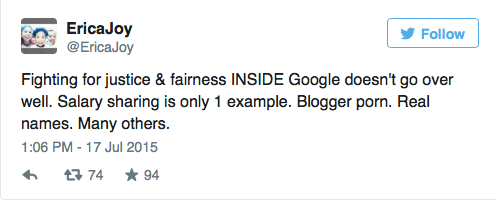If You Think Google Is A Perfect Place To Work, I’ve Got A Virtual Bridge To Sell You

Forbes has published a list of Best Companies For Work-Life Balance, and I advise approaching it with the same facial expression — lifted eyebrows, quirk of the mouth — with which you perhaps have approached its previous lists, such as 2015’s Least Stressful Jobs. Ready? OK, here we go.
The companies on this list have at least 100 employee reviews on Indeed and hire primarily full-time workers. The list does not include government or military organizations, colleges and universities, nonprofits, or staffing agencies.
“Creating work-life balance in a company is a choice,” said Paul D’Arcy, senior vice president at Indeed. “It’s not a luxury that comes with one industry or one type of business model.”
The 25 companies on this list come from a variety of industries and offer a wide range of careers. D’Arcy notes that organizations of varying profitability and different types of workforces all made the list “because of the culture they’ve built.”
The list includes Colgate-Palmolive, Costco, H&R Block, Wegman’s, Nokia, and various others, but because of its terse, slideshow-y nature, it doesn’t explain why these companies are better for balance-seekers — you know, parents, marathon-runners, people who are super into origami or Netflix or, frankly, anyone who likes spare time — to work for.
I am especially suspicious of and perplexed by Google at #5. I mean, I know Google perks are amazing. I’ve eaten in the free cafeteria, I’ve watched employees zoom by on colorful scooters, I’ve heard about what it’s like on the inside to be someone whose brain is actually valued by her managers. (Amazing!) But when a place offers to do your laundry for you and help you get your hair cut on-site, doesn’t that imply that they basically want you to live there? How Stuff Works made this point:
Several [tech companies] offer on-site benefits, which have the added bonus of keeping the employee workforce in the office more often. Give employees enough reasons to stick around and you’ll likely see productivity go up. Why head home when everything you need is at work?
How does that jibe with work/life balance? Sounds like a perfect situation for workaholics and an awkward one for anyone who wants to do their own wash and get their hair done in their own time, possibly while also doing origami / marathon trainings / Netflix / etc.
Then there are the dissatisfied Google Express employees, who are attempting to unionize, since their current situation doesn’t seem very conducive to work/life balance either:
Google Express workers are seeking improved wages, working conditions and workplace treatment, Aloise said. Workers say they have been harassed to work faster in poor conditions with damaged equipment, cracked floors and failing electrical systems that have resulted in fires.
They also are upset over Adecco’s short-term employment agreements that require workers to leave after two years, he said.
“The biggest thing is they tell them when come to work only they are only going to be there two years and after two years we’re going to get rid of you,” Aloise said. “They still haven’t gotten a decent explanation about why that’s something they are doing. There’s bad working conditions and low wages of $13 or $14 an hour.”
And perhaps you heard about the furor begun by a female (now ex-)employee who put her salary in a spreadsheet and encouraged her coworkers to do the same?
Other employees began sending her “peer bonuses” (at Google, staff can nominate each other for $150 bonuses, which are added onto their monthly paychecks). Baker claims that these were rejected or blocked by her manager. Colleagues, meanwhile, were successfully negotiating new salaries based on information from the spreadsheet — though not, generally, when they actually brought the spreadsheet itself up with their bosses. …
Baker doesn’t imply that the episode drove her to leave the company, and it seems that the database is still alive and well somewhere, helping other employees wrangle pay rises. But the whole episode emphasises a real problem with the “pay unfairly” policy: underperformers, or even average performers, will lose motivation if they know that their peers are far better compensated for their efforts than they are. Google’s apparent dislike of pay transparency implies that they’ve clocked onto this, and office harmony relies on a culture of silence.
Here’s the full Storify of Baker’s tweets, including this one:

So, okay, maybe that isn’t strictly speaking about work-life balance, but it’s related, in terms of how the office culture functions, and it’s disturbing nonetheless.
For a different take, check out this CNN list of companies that allow or even encourage employees to work four days a week.
Support The Billfold
The Billfold continues to exist thanks to support from our readers. Help us continue to do our work by making a monthly pledge on Patreon or a one-time-only contribution through PayPal.
Comments